Today’s question is:
What activities or lessons are you doing with students to end this crazy year?
Endings are important for a variety of reasons, including the fact that it often frames how we look at the future.
As we approach the end of this COVID-19 interrupted school year, four teachers share their own plans for the coming weeks.
In addition to their suggestions, you might find other ideas at Best Ways to End the School Year.
I’ve also recently learned of two other sources that might be worth exploring:
How Do You Close the School Year During Distance Learning?
American Federation of Teachers “Capstone Projects”
I am asking students to work on two reflective activities: one is a form to help me write letters of recommendation for them and another is on an evaluation of our year in general and the last two months more specifically. I also wrote about another idea this weekend as a result of watching President Obama’s online commencement speech.
Today, Michelle Shory, Ed.S., Irina V. McGrath, Ph.D., Holly Spinelli, David Sherrin, Kelsey Pycior, Sarah Said, Jacquelyn Willer, and Helen Vassiliou share their plans.
Year-End Reflection for Students
Michelle Shory, Ed.S., is a district instructional coach and Google Certified Trainer in the Jefferson County public schools, Louisville, Ky. She serves five high schools in the district. In addition to coaching, Michelle designs and implements professional learning experiences for teachers across the district. She is passionate about literacy and helped establish Dolly Parton’s Imagination Library in Louisville.
Irina V. McGrath, Ph.D., is a district instructional coach and Google Certified Trainer in the Jefferson County Public School (JCPS). She is also a co-director of the Louisville Writing Project (LWP) and the University of Louisville adjunct who teaches literacy and ESL methods courses.
Life’s most important lessons are learned through reflection. Reflection is also a great way to consolidate learning, process our feelings, and share about ourselves. As we struggle with engagement during this period of nontraditional instruction, we have found that students really love talking about themselves and learning more about classmates.
Creating a year-end reflection is often a good culminating project, but it seems to be essential this year. Allowing students to reflect, share, and document their feelings about this time in an open-ended way can serve as a reflection of learning, as well as documentation of a once-in-a-lifetime event.
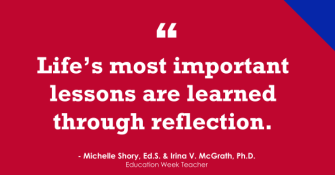
Looking to the past and the future
David Sherrin is the father (and temporary educator) of three young children, a social studies teacher at Scarsdale High School in New York, the author of Authentic Assessment in Social Studies: A Guide to Keeping it Real, and recipient of the 2014 Robert H Jackson Center National Award for Teaching Justice. He maintains the teaching website JADE Learning. You can contact him at: dsherrin@scarsdaleschools.org:
When considering how to wrap up the year in a distance learning environment, I think we need to focus on two separate areas: 1) a final course assessment; and 2) closure activities.
Assessment can seem tricky in distance learning, especially if we still feel tied to traditional notions that equate assessment with tests. Fortunately, at least in New York, we are liberated from the high-stakes statewide tests this year. This freedom should be seen as an opportunity to provide creative, joyful, and authentic assessments. In most disciplines, including in history, the concept of “authentic” ought to expand beyond formal writing and into media such as podcasts, painting, film, panel discussions, and creative writing.
We should still provide students with a final project, but let this be a year (and perhaps the start of a continuing practice) in which we prioritize creative expression when doing so. The kids need it; many of our older students are not even taking an art class. Instead of providing a rigid format for their work, slice open the box and allow them to step out and explore.
Create the environment for what Denise Pope calls voice and choice, whether in the topic they choose to pursue or in the format they use to express their understanding and argument. This final project will provide more meaning and joy for them as they finish up a difficult distance learning springtime. I’ve done this throughout the semester and received multiple letters of gratitude from parents for providing this creative opportunity to students.
In terms of emotional closure, we can provide meaning by looking to the past and also to the future. I think two simple questions for virtual discussion can do the trick: 1) What was your most positive memory from our class this year? 2) What are you most looking forward to this summer?
By doing so, we help them remember that the world was once better than it is now and that it will, once again, be better in the future.
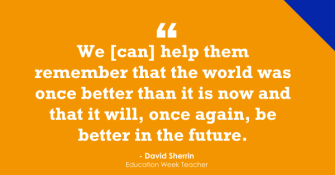
“I turn to my students for guidance”
Holly Spinelli is an active member of the National Council of Teachers of English’s Committee Against Racism and Bias in the Teaching of English, who began her career as an English teacher and student-rights activist in New York City public schools and continues this work in a public high school in the Hudson Valley of New York and as an adjunct instructor at SUNY Orange County Community College:
The pressure to end this year “right” is overwhelming, especially when I think about my high school seniors. However, as I plan the content and activities to offer during these final weeks, I turn to my students for guidance. I created a small writing prompt for students to share their vision for their learning. This may sound unwieldy, but when I offered a similar assignment to help me shape their course of study shortly after distance learning began, the students had excellent suggestions, ideas, and some sharp focus on the content they’d like to cover. I trust my students. They want to learn. They, too, want to end the year in a manner that is “right” for them.
Once I collect their feedback, I hope to combine their ideas with open-ended writing prompts to help students process and reflect on their distance learning experiences. They deserve opportunities to unpack what they’ve endured. Our final assignment will be a prompt for students to share their vision for education’s future. We, the adults, should listen. If we want to plan for their future, it is critical that students’ voices lead the way, or at the very least, are centered in the conversation.
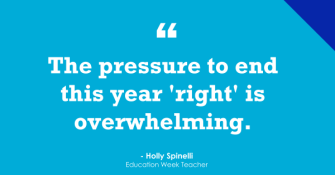
“History through our eyes”
Kelsey Pycior balances her time teaching social studies at Manville High School in Manville, N.J., and volunteering with the following children’s bereavement nonprofits: Tragedy Assistance Program for Survivors, Comfort Zone Camp, and Tuesday’s Children’s Project Common Bond:
End of year lesson: My U.S. History 2 classes will be ending the year with a virtual discussion called History Through Our Eyes. Typically US2 wraps up around 2000-2008, depending on the pacing of the school year. This allows us to bridge the gap between where we end in our content and what is going on in current events. Students reflect on the historical, social, political, technological, economic, or other events that have occurred during their lifetimes. We then talk about the impact of these events on the world and how they may or may not be studied in future textbooks.
As a way to model the discussion, I lead off with what has happened since 1992, the year I was born, from my perspective, and bring them to their year of birth. They pick up from there. It is always a successful wrap-up activity, as it puts their lives and experiences into context regarding how they fit into the bigger picture of our ever progressing society. Overall, they enjoy guessing what major moments of their lives will be studied by their children and grandchildren and many generations to come.
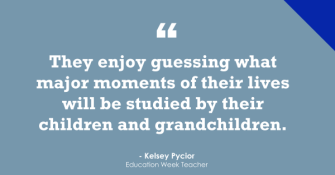
Celebrating and reflecting
Sarah Said currently serves as the director of language and equity programs at the Elgin Math And Science Academy Charter School In Elgin, Ill.
Jacquelyn Willer serves as the dean of students at the Elgin Math and Science Academy Charter School:
The end of the year needs closure. Our school, the Elgin Math and Science Academy charter in Illinois has created a system that still allows for our students to get the closure they need. Being an EL (Expeditionary Learning) Education school, we wanted to still uphold the structures and core values of EL Education as we created our end-of-the-year activities.
Motivation From Teachers
Using a Flipgrid platform, teachers are now creating motivational short videos. These videos will be pulled off of Flipgrid and shared with families. Teachers wanted to leave students with uplifting statements for the summer.
Virtual Celebrations of Learning
Typically, EMSA has celebrations of learning to celebrate the end of an ELA Module each quarter that is science- or social-studies-infused. Last year, we held the celebrations within our building, and parents were able to visit each classroom. Students shined as they presented their learning. This year, our students are going to be recording their reflections on celebrations of learning. These will be videos that they will present on performance tasks they would have presented at the end of fourth quarter.
Reflections of Growth
Students will be doing an end-of-year reflection on their growth and goal setting in math, ELA, and our Habits Of Scholarship. Teachers will be following a format that supports the discussion of the schools’ content. Students will also be completing a survey on their growth within our Habits of Scholarship: Respect, Responsibility, Creativity, and Courage. They will also complete an end-of-the-year self-portrait. In addition to the reflection work we asked students to do, we are asking our older students to participate in documenting history for the “I survived” series that is doing a live collection for COVID-19.
Learning More for the Future
Students and staff will be surveyed about their experiences in e-learning. From students we are learning about how they felt about their academic experiences with e-learning. From staff, we are learning about their comfort levels with e-learning tools and what they would like to learn more about.

Games & questions
Helen Vassiliou is a proud ESL specialist in West Chester, Ohio, serving the greatest kids and parents at Adena Elementary School:
Last week, I went back and cleaned out my classroom space, frozen in time, stuck on March 12th. I took a deep breath and thought, “This final week of remote learning has to be special just like the kids.” I wanted our time to be about reflection and fun and to laugh together again. I decided to use the Whiteboard.fi website to play Pictionary during a Zoom meeting. We laughed until our stomachs hurt. Afterwards, through Google Slides, we took turns answering questions like, “What was the most interesting thing you did at school this year?” and “What do you wish you learned but didn’t” These questions got us to reminisce and talk, and for a few minutes, we forgot that we were meeting virtually instead of in person.
After sharing my Bitmoji virtual room scavenger hunt with them via the Seesaw app, I played the guitar to them one last time, and we all sang to Andy Grammer’s “Don’t Give Up on Me.” I will never forget these last moments together and I hope they don’t either. COVID-19 did not get the best of us—it made us closer.
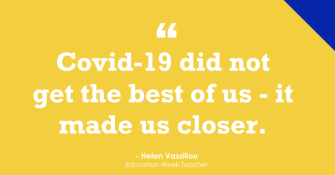
Thanks to Michelle, Irina, Holly, David, Kelsey, Sarah, Jacquelyn, and Helen for their contributions!
Please feel free to leave a comment with your reactions to the topic or directly to anything that has been said in this post.
Consider contributing a question to be answered in a future post. You can send one to me at lferlazzo@epe.org. When you send it in, let me know if I can use your real name if it’s selected or if you’d prefer remaining anonymous and have a pseudonym in mind.
You can also contact me on Twitter at @Larryferlazzo.
Education Week has published a collection of posts from this blog, along with new material, in an e-book form. It’s titled Classroom Management Q&As: Expert Strategies for Teaching.
Just a reminder, you can subscribe and receive updates from this blog via email or RSS Reader. And if you missed any of the highlights from the first eight years of this blog, you can see a categorized list below. The list doesn’t include ones from this current year, but you can find those by clicking on the “answers” category found in the sidebar.
This Year’s Most Popular Q&A Posts
Best Ways to Begin the School Year
Best Ways to End the School Year
Student Motivation & Social-Emotional Learning
Cooperative & Collaborative Learning
Teaching English-Language Learners
Entering the Teaching Profession
I am also creating a Twitter list including all contributors to this column.
